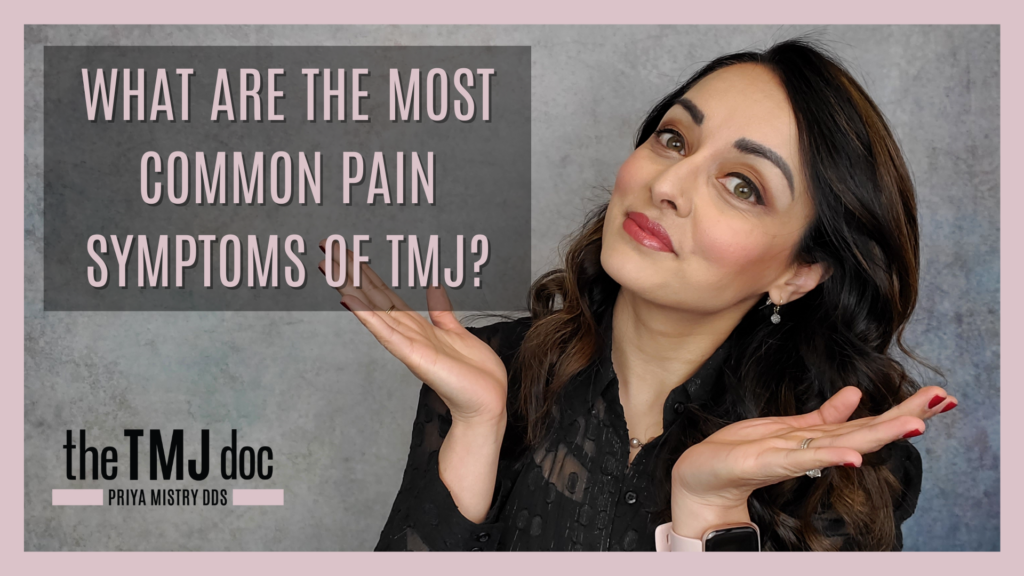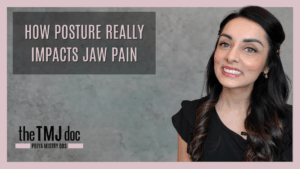86% of people experience Temporomandibular Joint Disorder (TMJ/TMD) at some point in their lives! Even though TMJ/TMD is fairly common, it is often misdiagnosed or overlooked by doctors. This is because there is no standardized curriculum for diagnosis and treatment of TMJ/TMD in medical or dental schools. As a leading TMJ Dentist in Vancouver, WA – Dr. Priya Mistry understands the importance of properly diagnosing TMJ disorder and devising the most effective treatment plan. Read this blog in its entirety if you’re wondering whether you have TMJ/TMD.
The 3 Components of TMJ/TMD Pain
TMJ Disorder presents an array of symptoms, but one of the first steps in determining if a patient has TMJ/TMD is to assess these three main components: quality, duration, and frequency of pain.
- Quality: A doctor will ask you to rate your pain based on a pain scale. TMJ pain may range from mild to severe or downright debilitating.
- Duration: TMJ pain can be intermittent meaning that it comes and goes or is chronic, which means that pain occurs daily (or most days) and lasts longer than six months.
- Frequency: Notice the frequency of your pain. Does it occur every day when you eat? Or do you have headaches and jaw pain upon waking every morning or only with certain activities like eating or talking?
Most Common Symptoms Associated with TMJ Disorder
- Dull, Aching Pain: Pain with TMJ/TMD can feel dull, achy, and persistent. The pain may fluctuate over time – intensifying and backing off, depending on the activity. This type of pain may be caused by muscle tension and inflammation within or around the jaw joints.
- Pressure or Tightness: Due to inflammation and reduced blood flow, a feeling of pressure or tightness in the jaw joints often occurs. These sensations may also extend to the ears – resulting in a feeling of fullness the ear, tinnitus, hearing loss, dizziness, and/or ear pain.
- Sharp, Stabbing Pain: Pain with TMJ/TMD can be sharp, zinging or stabbing – specifically during jaw movement like chewing or opening wide to yawn.
Nerve Pain Associated with TMJ Disorder
Aside from skeletal and muscular symptoms, TMJ/TMD also affects nerves.
- Throbbing Pain: Rhythmic pulses or pressure may mean that a nerve is compressed, which commonly occurs in or near the jaw joints due to the proximity of the trigeminal nerve.
- Electric or Pounding Sensations: Nerve pain is often described as an electric or pounding sensation that causes numbness or tingling in the affected area.
- Itchy or Burning Sensations: Although rare, some TMJ dysfunction sufferers may experience itchiness or burning on the surface of the skin at the jaw joints or in the ears, which could indicate neurogenic inflammation or neuropathy as a result of TMJ/TMD.
Temporomandibular Joint Disorder Examination in Vancouver, WA near Portland OR
Dr. Priya Mistry is a TMJ Dentist serving those in the Pacific Northwest. Many people from outside this area also travel to see her. Dr. Mistry provides non-surgical treatment options to care for those with TMJ/TMD. She celebrates a 90% success rate in her unique and effective treatment modalities!
To learn more or schedule your consultation, please contact Dr. Mistry’s office by calling (503) 255-8293.







